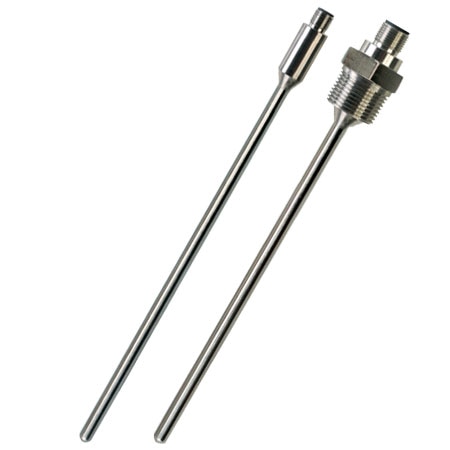Welcome to our new website, found an issue or bug? Please report it here

TH-22
Thermistor Immersion Probes with High Temp M12 Connections
- Maximum Continuous Use, 200°C (392°F) [Short Term Use to 250°C (482°F)] for Probe and Connector
- Vibration Tested to ASTM-E1137: 3Gs from 5 to 500 Hz
- Excellent Long Term Stability
- Tolerance: ± 0.2°C From 0 to 70°C (32 to 158°F)
Product Overview
- Accuracy ± 0.2 °C (± 0.36 °F)
- Accuracy Note ± 0.2°C (0 to 70ºC)
- Color Code Standard ANSI
- Connector Temperature, Max 200 °C
- Connector Temperature, Min -50 °C
- Electrical Connection M12 4 pin Male
- Enclosure Ratings IP67
- Insulation Resistance 100 MΩ
- Insulation Resistance Note 100 MΩ minimum at 100 Vdc at ambient temperature
- Nominal Resistance/Curve Note Resistance at 25°C
- Operating Current 12 µA
- Process Temperature, Max 200 °C
- Process Temperature, Min -50 °C
- Response Time 14 sec
- Response Time Note Approximately 7 seconds (50%), 8 seconds (63.2%), 14 seconds (90%) in water flowing at 0.91 m (3') per second
- Sheath Material 316L Stainless Steel
- Temperature Sensor Type Thermistor
- Thermocouple Type N/A
The TH-22 Series thermistor probes are constructed with the 55000 Series glass encapsulated thermistor elements which provide excellent stability and accuracy. The connector design includes an LCP insert with nickel plated copper pins for high temperature applications, 200°C (392°F). With a maximum continuous temperature rating of -80 to 200°C (-112 to 392°F), and intermittent operation to 250°C (482°F), these thermistor sensors can be used in applications previously out of reach of epoxy coated thermistor sensors. The probes can be ordered in any length but we highly recommend a minimum immersion depth of 1.5". Short probes run the risk of error due to stem conduction effects.
Specifications
Temperature Range: -50 to 200°C (-58 to 392°F)
Thermistor Sensor: Refer to Table 1 on next page
Operating Current: 12 micro-amps
Insulation Resistance: 100 MΩ minimum at 100 Vdc at ambient temperature
Response Time: Approximately 7 seconds (50%), 8 seconds (63.2%), 14 seconds (90%) in water flowing at 0.91 m (3') per second
External Materials: 316L stainless steel sheath and housing except connector insert
IP Rating: IP67 with mating connector installed
Specifications
Temperature Range: -50 to 200°C (-58 to 392°F)
Thermistor Sensor: Refer to Table 1 on next page
Operating Current: 12 micro-amps
Insulation Resistance: 100 MΩ minimum at 100 Vdc at ambient temperature
Response Time: Approximately 7 seconds (50%), 8 seconds (63.2%), 14 seconds (90%) in water flowing at 0.91 m (3') per second
External Materials: 316L stainless steel sheath and housing except connector insert
IP Rating: IP67 with mating connector installed
PDFs & Manuals
Show Ratings & Reviews
Hi, I'm wondering how to determine the length of the probe and what needs to be considered in terms of deciding it? How to include the resistance of the probe (lead) into temperature calculation? Thanks!
Hi Gang Ren,
Thank you for the inquiry. In general 3 inches is minimum immersion length. This can vary depending on the media and the process flow. Fast moving liquids or gas allow for shorter lengths. Lead wire length can be ignored most often because lead length resistance is usually less then 5 Ohms, and thermistor resistance is in the range of 2000 to 10,000 Ohms. Please contact us for assistance in review of your application.
Date published: 2020-09-15